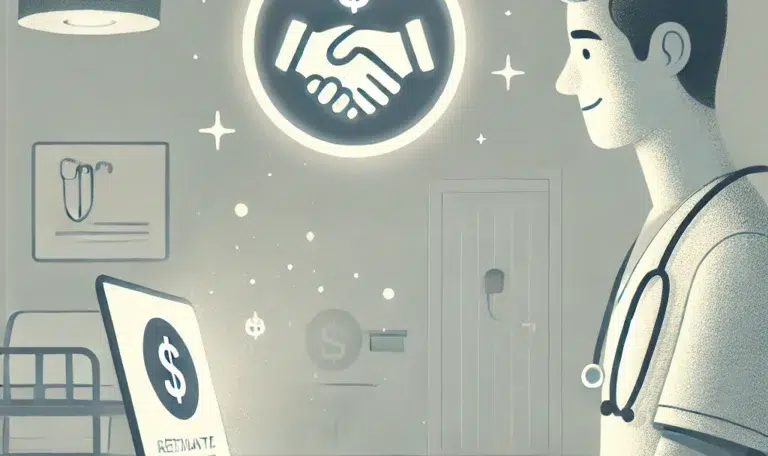Are You Missing Out on Paid Industry Collaborations?
Why many healthcare professionals never hear about legitimate, compensated opportunities — and how that can change.
Why So Many HCPs Miss Out on Paid Industry Opportunities
If you’re a healthcare professional, chances are you’ve seen colleagues participate in Paid Industry Opportunities, such as industry-sponsored research, speaker engagements at events, or collaboration on advisory boards. Maybe you’ve even been invited yourself—but didn’t follow up. Or maybe you weren’t aware of the opportunity at all.
You’re not alone. Many HCPs either don’t know about, don’t trust, or don’t have time for paid opportunities with pharmaceutical and medtech companies—despite these being valuable, often well-compensated collaborations.
An Accenture survey (2020) during the COVID-19 pandemic found that while 86% of HCPs appreciated more helpful communication from life sciences companies, 65% also felt overwhelmed by the sheer volume of content and outreach. This disconnect continues today, as HCPs struggle to identify legitimate, relevant opportunities in a sea of noise.
Why Paid Industry Opportunities Often Go Unnoticed
Despite billions spent on HCP engagement, many industry opportunities remain hidden due to:
Poor Visibility: Opportunities are typically shared through fragmented, private channels (sales reps, personal networks, third-party vendors).
Opaque Selection Processes: Most advisory and consulting roles are invitation-only, based on internal lists of known “KOLs.”
Administrative Burden: HCPs must often fill out duplicative forms, navigate compliance hurdles, and use multiple portals.
Time Constraints: Many HCPs simply don’t have time to follow up or decipher which requests are genuine.
According to Deloitte’s HCP contract management guide, these issues stem from disjointed internal systems, legal bottlenecks, and outdated engagement models. Without streamlined platforms, companies struggle to match the right HCP with the right opportunity at the right time.

What Types of Paid Industry Collaborations Exist?
Opportunities span the full lifecycle of product development and medical innovation. These include:
Clinical Trials (PI or sub-PI roles)
Advisory Boards (feedback on pipeline strategy or real-world challenges)
RWE & Post-Market Studies (data generation and insights)
Usability Testing (human factors and device testing)
Speaker Programs (clinical education and thought leadership)
Digital Health Pilots (AI validation, co-creation)
Peer Education (mentorship, curriculum design)
Compensation varies by engagement type, specialty, and geography. According to Accenture’s HCP engagement report, experienced HCPs may receive $3,000–$15,000 for advisory or speaker roles.
Compliance and Transparency: What You Should Know
Collaborating with life sciences companies is legal and ethical when done transparently. Global standards require:
Fair-Market Value (FMV): Fees must reflect the HCP’s qualifications and time—not prescription behavior.
Written Agreements: Engagements must have clearly defined scopes of work.
Disclosure of Payments: In Europe, EFPIA members must report annual transfers of value. In the U.S., payments appear in the CMS Open Payments database.
Venue & Audience Guidelines: As outlined in the U.S. OIG Special Fraud Alert (2020), speaker programs must have legitimate educational value and avoid luxury venues or off-label promotion.
Sidley Austin and Deloitte both stress that companies should use structured criteria and ensure Medically trained Scientific Staff, not sales reps, manage speaker selection.
What HCPs Say About the Experience
“I didn’t even know these opportunities were open to someone like me.”
“It’s hard to know what’s legitimate or worthwhile.”
“If it were easier to find and manage, I’d be much more likely to participate.”
These sentiments are echoed across multiple surveys. Deloitte found that 82% of pharma leaders believe their engagement strategies are effective, while only 28% of HCPs agree. Within3 also noted that fragmentation and lack of centralization reduce trust and responsiveness.
What Needs to Change
The current system:
Frustrates HCPs with manual tasks and opaque processes
Limits diversity by repeatedly engaging the same “inner circle” of KOLs
Misses insights from underrepresented, younger, or non-academic professionals
Wastes budget due to low ROI on scattered digital tactics
Reports from McKinsey, Deloitte, and IntuitionLabs all recommend HCP-centric digital infrastructure, better data integration, and transparent workflows to improve satisfaction and compliance.
What Meplis Is Building
At Meplis, we’re creating a platform where HCPs can:
Discover paid opportunities based on specialty and interests
Set preferences, availability, and compliance requirements
Connect directly with verified industry sponsors
Avoid redundant forms and scattered communication
Our goal is to make collaboration seamless—not another burden.
Want to Help Shape This?
If you’ve ever said:
“I’d love to contribute, but I never hear about these roles.”
“There should be one place to manage this—on my terms.”
Then you’re exactly who we’re building for.
Interested in joining our pilot or sharing feedback? Please contact us

